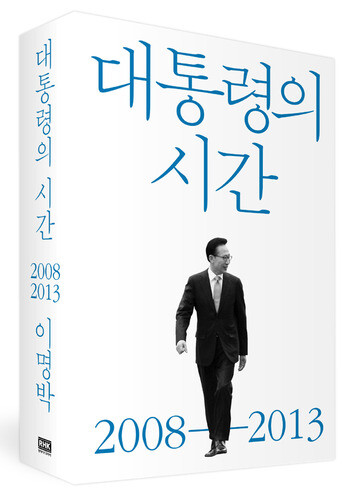hankyoreh
Links to other country sites 다른 나라 사이트 링크
Lee MB memoir’s revelations of diplomatic moments sparking controversy

Controversy is flaring over former President Lee Myung-bak’s memoir, in which he discloses the “hidden history” of summits with North Korea and China.
Critics say Lee, who has been out of office less than two years (his term was 2008-2013), not only violated international diplomatic protocol but left a major headache for future relations with Pyongyang and other governments. A longstanding diplomatic saying is, sausages and diplomacy are two things you don’t show the making of.
A Jan. 29 advance release of Lee’s autobiography, with a Korean title that translates as “The President’s Time,” shows a number of details that read as provocations or slights against former diplomatic counterparts. In detailing behind-the-scenes meeting between the South Korean Ministry of Unification and North Korea Unified Front Department for a summit in Nov. 2009, Lee claims that North Korea demanded 100,000 tons of corn, 400,000 tons of rice, 300,000 tons of fertilizer, and US$100 million worth of asphalt pitch. Earlier, he writes that Unified Front Department chief Kim Yang-gon, said he would “be dead if he went back” to North Korea without an agreement at a 2009 meeting in Singapore with then-Minister of Labor Yim Tae-hee.
The problem is that the out-of-context revelations about North Korea’s statements and actions are presented in a uniformly unflattering light, with an emphasis solely on the “unreasonable demands” and “begging by senior authorities.” Even if the quote from Kim turns out to be true, it would be still be considered inappropriate to print it while he is still working in the same position in Pyongyang.
“Inter-Korean relations are still a work in progress,” said Yang Moo-jin, a professor at the University of North Korean Studies.
“I’m not sure what’s going through the minds of Lee and the Park Geun-hye administration when they work together to disclose a transcript from the 2007 inter-Korean summit or do things like this,” Yang added.
Inje University professor Kim Yeon-cheol said the fallout is likely to last.
“These passages are going to be a burden not just for North Korea but for the Park administration too,” Kim said. “Even if they decide to hold a summit, it’s going to be impossible to have any behind-the-scenes talks.”
Lee also printed unfiltered statements from a summit with former Chinese President Wen Jiabao. In one passage, Lee quotes himself as saying, “A young person [current leader Kim Jong-un] has taken power in North Korea, and I’m worried he’s going to be in power for another 50 to 60 years,” to which Wen replies, “Do you think the principles of history work that way?” The implication that Wen agreed with the possibility of a regime collapse could potentially flare up into a diplomatic issue.
A signal of the seriousness of Lee’s revelations can be seen in the vehement response from Seoul last year when Japan disclosed details about the two-decade-old negotiation process in a 2014 report on the Kono Statement.
By Yi Yong-in, staff reporter
Please direct questions or comments to [english@hani.co.kr]

Editorial・opinion
![[Column] Season 2 of special prosecutor probe may be coming to Korea soon [Column] Season 2 of special prosecutor probe may be coming to Korea soon](https://flexible.img.hani.co.kr/flexible/normal/500/300/imgdb/original/2024/0426/3317141030699447.jpg) [Column] Season 2 of special prosecutor probe may be coming to Korea soon
[Column] Season 2 of special prosecutor probe may be coming to Korea soon![[Column] Park Geun-hye déjà vu in Yoon Suk-yeol [Column] Park Geun-hye déjà vu in Yoon Suk-yeol](https://flexible.img.hani.co.kr/flexible/normal/500/300/imgdb/original/2024/0424/651713945113788.jpg) [Column] Park Geun-hye déjà vu in Yoon Suk-yeol
[Column] Park Geun-hye déjà vu in Yoon Suk-yeol- [Editorial] New weight of N. Korea’s nuclear threats makes dialogue all the more urgent
- [Guest essay] The real reason Korea’s new right wants to dub Rhee a founding father
- [Column] ‘Choson’: Is it time we start referring to N. Korea in its own terms?
- [Editorial] Japan’s rewriting of history with Korea has gone too far
- [Column] The president’s questionable capacity for dialogue
- [Column] Are chaebol firms just pizza pies for families to divvy up as they please?
- [Column] Has Korea, too, crossed the Rubicon on China?
- [Correspondent’s column] In Japan’s alliance with US, echoes of its past alliances with UK
Most viewed articles
- 1Samsung subcontractor worker commits suicide from work stress
- 2‘We must say no’: Seoul defense chief on Korean, USFK involvement in hypothetical Taiwan crisis
- 3Is Japan about to snatch control of Line messenger from Korea’s Naver?
- 4Division commander ordered troops to enter raging flood waters before Marine died, survivor says
- 5[Editorial] Korea’s surprise Q1 growth requires objective assessment, not blind fanfare
- 6No good, very bad game for Korea puts it out of Olympics for first time since 1988
- 7US overtakes China as Korea’s top export market, prompting trade sanction jitters
- 8Korea’s 1.3% growth in Q1 signals ‘textbook’ return to growth, says government
- 9N. Korean delegation’s trip to Iran shows how Pyongyang is leveraging ties with Moscow
- 10[Column] Season 2 of special prosecutor probe may be coming to Korea soon